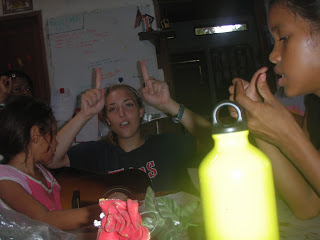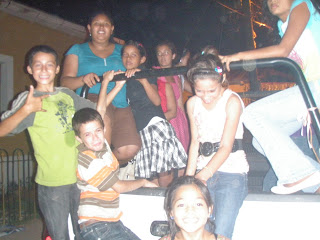
My name is Tiffany Ross and I am so excited to share this experience with you all so thanks for visiting! For those of you who don’t know me, I’ll let you know a little about who I am before explaining why I’ve chosen to serve at the Farm. Well, I am (nearly) a graduate of Florida State University and have worked as an intern this last year at Catholic Charities of Northwest Florida in the Refugee Department. I am a family girl and make it a point to always make them a priority in my life. I’ve studied Spanish for a long time and watched more telenovelas than I’d care to admit. I’m a passionate Catholic and I firmly believe in the power of sharing God’s mercy and love through actions rather than words. In high school I aspired to become an accomplished actress, loved performing on stage, and sang with my mom and the Lifeteen band at Church every Sunday. Since then, my dreams have changed (as they often do growing up) and I’ve realized that my heart is the most content when I’m loving others and sharing in their beautiful, broken lives.
I moved to Florida with my family
in 2004 when I was in the 7th grade and that’s when I first heard
about the Farm of the Child. Zulena
Pescatore—a founder of the mission—came to my school with her daughters to
speak about the Farm of the Child and, at the time, it didn’t mean much to
me. It was later on that my family
decided to go on a mission trip with our Church to visit this beautiful place
and experience for ourselves God’s grace in an underdeveloped nation. I had just graduated from high school the
first time we went and it changed my life completely. We went again the next year and it was after
that trip that I realized how much of my heart I had left with those
children. I applied to go the next
summer as a short-term missionary and it only increased my desire to serve
there. I want to share this beautiful
mission with you today and, hopefully, continue to share with you in this
journey over the next 28 months. Right
now I’d love to tell you a little about the Farm of the Child, how it
functions, and who it serves.
Near a small town on the luscious
tropical coast of Honduras, there is a Catholic orphanage. It is a beautiful place that
was started by a man named Vincent Pescatore. He left his corporate American job at a young
age to answer a call to do mission work in Guatemala where he started the
original Farm of the Child orphanage and met his wife. Later on he decided to spread the work to
Honduras and bought a plot of land right by the coast. All he had to start were a few Franciscan
Nuns, the support of his wife and five young, beautiful children, and a few
very ambitious college graduates from the States. Because of tension with the Honduran
government, it was only safe to build at night, so that’s what they did. There’s no denying the fact that there were
many road blocks at the beginning of this beautiful mission, but Pescatore
never let that discourage him. Sadly, on
January 3 at the age of 35, Pescatore and his brother-in-law passed away in a
plane crash right by the Farm. They were
bringing in supplies and got caught in a storm that sent them straight towards
the mountain side. Despite this tragedy,
the Pescatore family and the missionaries did not let that stop the mission. If anything, it gave them more of a reason to
fight for it.
The Farm of the Child has been
effectively educating, housing, providing for, and loving orphans and young
children in surrounding villages for nearly 17 years. Today it is run mostly by American and
Nicaraguan missionaries, the wonderful Franciscan Sisters, and Ysmary Trejo,
the onsite director. They have the 2nd
best Catholic school in the country on the Farm’s property, providing education
for grades K-8. Each grade has its own classroom
and the middle school, more recently built, has 4 rooms including a computer
lab (which functions well despite the frequent power outages). The school is separated from the soccer field
and communal homes by a beautiful chapel that has been dedicated to Vincent
Pescatore, which overlooks the entire orphanage.
Looking down the hill from the
chapel is the beautiful Caribbean Sea. Close
by is a clinic that provides service for the local villages a few times a week
run by American missionaries who are trained Nurses. The missionaries make it a priority to teach
the locals about living a healthy lifestyle in all aspects of raising children as
well as taking care of their own bodies, which is very important considering
most of the people in Honduras have never had the opportunity to be educated
past the 6th grade.
The rest of the campus consists of
small, family style homes for the orphans, missionaries, and Nuns. Each house for the children is set up with Honduran
“house parents”. The children are split up by gender and age levels. For example, boys who are newborn babies up
to ages 4 or 5 would live in the St. Joseph house. It creates a safe environment for these
children and sets a great example of how a loving family works, lives, and
loves each other, giving each child hope for a better future when they grow up
and have a family of their own.
The missionaries live in one house
together right on the beach next to the Convent. They do all sorts of jobs needed on the
Farm. Many of them are teachers at the
school and Social Workers helping the children in whatever ways needed. Some of
them are also outreach coordinators, nurses, psychologists, and maintenance/
security directors. A few years back the
maintenance crew completed building a big, thick fence with barbed wire at the
top that runs around the entire Farm which will help ensure the safety of all
those who live, work, worship, play, and go to school there. They also have a night staff that patrols the
fence and gate at night. My mother
swears God has put a bubble over that place.
No matter what kind of horrible things are going on in the country or
what kind of desperation locals may be driven to out of poverty, the Farm seems to be and to have always been
protected.
I have been so blessed to play
with, work with, and truly get to know these kids the past few summers. They are so happy, so full of life, and in so
much need of stability. They truly
opened my heart to this mission. It is
very evident how much these children desire true, authentic, and unconditional love.
So, when you form a bond of trust with them, they welcome you with open
arms…and don’t ever want to let go. I
remember one boy, Carlos, who just loved hugs.
He was around 6 or 7 years old, but that boy was a tank and very
athletic. He just loved piggy back
rides, being swung around, and running, jumping hugs. I could barely catch him every time, but the
love he had to share was simply something I couldn’t reject. He also enjoyed chasing the girls around with
little crabs he found and a hose whenever he could get his hands on one. Then there was his friend Roni who was a
little comedian. That boy had a joke for
everything and was all smiles and laughter all the time. Nelsi, one of the girls about 7 or 8, taught
me how she climbed the trees to pick fruit in her backyard. She wanted to show me that girls like us
could really be as strong as the boys.
Nelsi knew how to swing a machete and dig a trench like a pro and didn’t
mind showing you how well she could do it.
But, as soon as the storms came, she had no problem dropping everything
and grabbing my hands to go dance in the rain.
 |
| Celebrating Mass with the neighbors at a local villagers home |
 |
| My special friend Belgia |
 | |
| At the Quincinera of the Farm! (15th anniversary celebration) |
 |
| praise and worship with the girls |
 |
| A dear friend from up the mountain in Buena Vista |
 |
| the kids after Sunday Mass |
 |
| my little sister Sigri |
Sigri, another girl around age 16,
was simply one of a kind. Because of the
abuse she went through as a child, her mind-set was not on the level of other girls her age. Despite that fact, she was bright, bubbly, loud, and full of energy and
sarcasm. She and I seemed to have formed
a pretty tight relationship. She would
make fun of me for my gringo Spanish, but always referred to me as her sister. She always had something funny or
smart-alecky to say, but man did we get a kick out of each other. Leaving her the second summer was much harder
than I expected. The tough girl attitude
she put on to protect herself from rejection fell away as she cried on my shoulders
not wanting to let me go. In that long,
drawn out, teary good-bye, I promised her I’d be back soon enough. I am so proud to say that the promise I made
to her those years ago I will be able to keep.
The summer I spent as a short-term
missionary was much different than I expected.
I had much more responsibility than I anticipated. It was also different because I was not only
living there, but also cleaning, cooking, and learning the lifestyle of the
Honduran people and the missionaries. I worked
a lot with the Franciscan Sisters on projects for the orphans and the local
villagers; I brought my guitar and all the Spanish worship music I could get my
hands on. Essentially, that summer was a
great opportunity for me to discern this kind of missionary work. While it was a tough learning curve, it was
beautiful and life-giving.
The Honduran people have truly
stolen my heart with their love, their faith, their simplistic lifestyle, and
their culture. I am so incredibly
blessed to have been given this opportunity to grow deeper in my faith and to
learn more about myself and I am so happy to be able to share it with you. I want to ask you for your prayers for the
Farm of the Child and for the other missionaries that will also be preparing
their hearts and fundraising this summer. In the wise words of an Italian nun I
once met, “pray for money, for it is a necessary evil.” So, if you find it is within your means to
help me with donations, even if it is only a little, it would truly benefit
this cause because I cannot go without the proper funds. If you would like to donate now, please click.this safe PayPal link.
Thank you for your interest in this
mission and for your time!
No comments:
Post a Comment